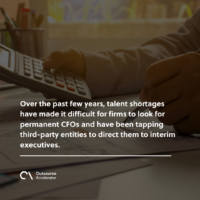Expertise on-demand
Interim chief financial officers (CFO) traditionally help firms go through a transition period but have become in-demand talent for various use cases.
Demand for interim CFOs surged to 46% in 2024, according to the Business Talent Group (BTG), as firms are on the hunt for on-demand experts in financial controls, accounting, and auditing.
Interim executives usually assume a temporary role while the firm looks for a permanent replacement. The interim assignment, which lasts from six to 18 months, gives businesses immediate access to expertise. They also provide operational stability and momentum and help reduce risks associated with leadership transitions.
Over the past few years, talent shortages have made it difficult for firms to look for permanent CFOs and have been tapping third-party entities to direct them to interim executives. The changes in business models have unveiled the different uses and benefits of an interim CFO. Businesses are now discovering that a temporary finance expert can meet their needs at a given moment.
Interim CFO power
Permanent CFOs must be skilled in accounting, operational management, investor relations, business execution, and a whole slew of others. But in reality, some of them are just experts in one area, which has led to inefficiencies and gaps in a firm’s financial operations. The emergence of artificial intelligence (AI) and automation has added a new set of responsibilities to the CFO, further complicating the post. CFOs are blamed for all sorts of things that tarnish the professional relationship of all the parties involved.
Fortunately, the rise of the interim executive has empowered businesses to hire an expert to address one specific goal or solve a particular problem. For example, a finance executive well versed in accounting can focus on that task alone and present findings every month and not be bogged down with unrelated queries. This ensures accurate and timely financial reports, which improves the business’ decision-making process.
In other instances, a temporary CFO guides a firm through a merger, an initial public offering, or a one-time project that needs specialized financial expertise. A CFO with solid AI credentials can also implement new digital processes for a corporation. They can also help a struggling firm in the middle of a financial crisis. These specialized workers are readily available through third-party recruitment channels.
Clarify objectives
As in the case of new work trends, the challenge lies in implementation. There are lingering concerns about cultural fit, workloads, continuity, and confidentiality, among others.
That’s why both parties must outline expectations and align their goals from day one. The business must provide a comprehensive briefing of its financial status and what needs immediate action and set a timetable for deliverables.
Critically, the interim finance executive must also be introduced to team members to streamline communication and build trust and rapport. They must also work closely with senior leaders and other C-suite members to ensure cohesive leadership and a shared strategic vision.
The question for your business
How can interim roles strengthen your business?




 Independent
Independent





















